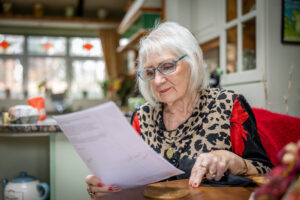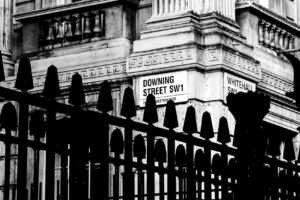Rather listen? Simply hit the play button and listen to the article in full
- Find your own murder club 00:00
Linda Harrison discovers why people love working out a real-life whodunnit
Saturday morning in Newcastle, and a group of 30 men and women are sitting in a meeting room talking over a cuppa. But they’ve not come to the city centre for a casual chat. They are members of True Crime Club. And over the next couple of hours, there will only be one topic of conversation: murder.
Joccoaa Tyne, host of True Crime Club, says: “A group of us meet up every other weekend. We discuss cold cases and try to work out what happened. It’s never anything too recent, but it’s always an unsolved case – and a good whodunnit.”
About half those who attend True Crime Club at the iconic Blackfriars venue are retired, though Joccoaa says it attracts a wide range of ages, from 19 to over 80.
The amateur sleuths hail from a variety of professions – web designers, teachers and dentists, a retired GP, funeral practitioner and council worker. Before each meet-up, Joccoaa chooses an old case, and then circulates a list of podcasts, TV interviews and media reports from that time to participants.
So, by the time they meet on the Saturday morning – sometimes for the first time – everyone is equipped for a good debate, and ready to share an opinion on the fate of the victim.
Joccoaa says: “I just love it. I find the cases fascinating, and I get to spend time talking with people about these murders.
“We don’t cover anything too grisly or sensationalised. If it’s a murder, there might be some details, but it’s more about the circumstances of the person. We’re interested in eye-witness testimonials or what the victim’s family said in interviews to work out what happened.”
Lost in time
The group sometimes discusses other historical mysteries – a missing person or
a flight that vanished. Among the more notorious murders is the case of the Black
Dahlia, when the body of aspiring actress Elizabeth Short was found in a Los Angeles
residential street in 1947 – cut in two.The FBI got involved, and more than 50 suspects interviewed, but the killer was never found.
Joccoaa first got interested in true crime during the pandemic. Her job in corporate real estate meant she was often driving her car alone. So to pass the time, she started listening to true-life podcasts. She was soon hooked. She says: “After the pandemic, I thought, ‘I have to talk about this with someone!’
“I think we all lost a sense of community during that time. So, I set up True Crime Club not knowing what to expect. The first time, three people turned up. The next, seven people. And it’s been going ever since. It’s a safe space and a fantastic, friendly community. I’m really proud of it.”
More than 900 members from around the globe follow True Crime Club online, with 20 to 30 people discussing unsolved murders at the fortnightly events. So why are we so captivated by true crime? “We all love a good story like an Agatha Christie,” says Joccoaa. “Who doesn’t love working out the puzzle of a whodunnit? “I think the attraction for many retired people is the problem-solving. At True Crime Club, we’re constantly picking up on clues, trying to get an idea of what happened. We take a vote at the end of meet-ups – often we have very different views on what we think happened.”
Joccoaa also hosts ghost tours and spooky castle days. She is currently organising her biggest project to date: the first North East True Crime Forum. Scheduled to take place on 12 July, the in-person event will include workshops, speakers and local podcasters. With so much true crime content out there – books, TV series, documentaries, podcasts and plays – the trend for turning amateur detective is a national obsession. Online and live events discussing real-life murders are growing in popularity, from the Manchester Detective Club to Crime Club at Nottingham’s National Justice Museum. And the big immersive true crime event CrimeCon UK is heading to London and Manchester this year, featuring talks by criminologists, authors and investigators.
Armchair detectives
Richard Osman’s Thursday Murder Club novels, in which a group of pensioners try to solve a murder mystery at their upmarket retirement village, has an army of loyal fans. The film version (pictured), starring Helen Mirren and Pierce Brosnan, is due out on Netflix this year.
Then there’s the hit comedy Only Murders In the Building on Disney+, now in its fifth season. It’s the story of a trio of neighbours from a New York apartment block, including semi-retired actor Charles Haden-Savage, played by Steve Martin. With a shared passion for true crime podcasts, they stumble upon the body of their dead neighbour, and find themselves embroiled in their own murder-mystery.
True crime certainly seems to be making a killing. Mark Bridgeman is a best-selling author who hosts historic real-life murder trial events around the UK, where the audience is the jury and Mark is judge, defence and prosecution. The audience hears the evidence, then decides if the defendant is innocent or guilty.
“It’s become really popular,” says Mark. “I’ve had to copyright it because people keep trying to copy it! The majority who come along are female. Often, someone will come up to me and say they’re a retired barrister or chief inspector.”
Mark, who lives in Scotland, focuses on cases from the 1960s and 1970s or earlier, and likes to focus on the social angle, helping the jury to think about life at that time. And with the death penalty to consider, the audience’s verdict is the difference between life and death.
“It adds a bit of spice for the jury,” says Mark. “But I like the audience to put themselves in the mind of being on a jury back then – in 1910 it was all-male jurors;
women weren’t allowed to serve on English juries until 1921. And there was no GPS,
CCTV or DNA, so a jury had to accept a much lower level of evidence.
“People had to make decisions based on what we’d now refer to as circumstantial evidence. How many wrong decisions were made? I recently did an event with a genuine Edinburgh murder case from 1920. To decide who killed the victim, it was literally the word of a man against the word of a woman.
“As a juror, it often comes down to who you like the look of in court,” he adds. “Who comes across the best?”
The events are popular at book festivals, and Mark likes to make the experience as realistic as possible, providing participants with a notepad and pen, like real jurors.
Now in its fifth year, Mark came up with the idea while looking for a more entertaining way of promoting his books.
His first book, The River Runs Red, includes stories of murder from highland Perthshire’s dark past. Mark adds: “I’ve always been interested in true crime. I think people like to have a slight thrill and sense of danger. Watching or reading a real-life murder story is much safer than walking down a dark street alone, but you still get that slight adrenaline rush.
“If there’s a crime involved in a story, it makes everyone involved more interesting
than they are in real life. That applies to books, TV and films. The most mundane
things can become sinister, and that fascinates me.
Rather listen? Simply hit the play button and listen to the article in full
- Find your own murder club 00:00












